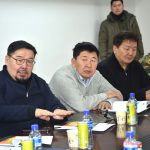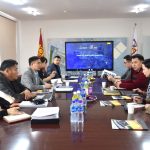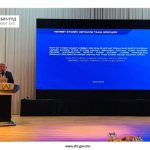We have invited Ms.Oyunchimeg Magvan, CEO of Mongolian National Chamber of Commerce and Industry, to discuss the circumstances of Mongolia, Russia and, China regional economy trade and the 13th Joint Trade and Economic forum took a held on June 15 to 16, 2017 in Ulaanbaatar, Mongolia.
-Let’s start our conversation about the 13th Joint Trade and Economic Forum of Mongolia, Russia and China. Can you please give the readers more detailed information on the trilateral trade and economic forum?
-Mongolian National Chamber of Commerce and Industry (MNCCI) is going to organize the 13th Trilateral Trade and Economic Forum in Ulaanbaatar. It is the largest and most important gathering of administrations of three chambers, where business entrepreneurs, business leaders, local and international investors, discuss ways to enhance the economic and trade cooperation between Russia, China and Mongolia as well as the role of the MNCCI in increasing the investment. It will be crucial to create system that enables us to work closely and successfully with government organization in tackling the challenges, so that the businesses will have less difficulties and operate in more favorable environment. The forum is an annual event, serving as the platform for strengthening the relations of trilateral business entrepreneurs and representatives of the branch chambers
– What makes this year’s Trilateral Joint Trade and Economic forum so special?
-This year’s forum focus on mining, infrastructure, environment and green development as well as food and light industry. A series of activities will take place within two days, including conference, exhibition, presentations, sectorial meetings and, B2B networking. Our foremost aim for this forum will be attracting foreign investment and investors’ confidence in Mongolia. As I mentioned before, we will introduce a new projects and programs in several important sectors with a view to attract most investors. The fact that Mongolia and Japan signed an economic partnership agreement makes Mongolia more advantageous at exporting to the world market without tariff and non-tariff barriers. Also, European Commission had provided GSP+ regulation with 7200 products to the Mongolian exporters. During the forum business enterprises will introduce their projects and proposals along with a private meetings with attendees.
-What are the issues facing to national manufacturer and exporters?
Our manufacturers need to attract foreign investment to apply world standards in their products, industry and service. We had problems exporting products during the financial crisis. As Mongolia is landlocked, we are exporting our products through Russia and China. In the meantime, we face tariff and non-tariff barriers. So the trilateral forum goals are to overcome these issues in the business industry, define what regulation would be suitable to facilitating trade and transportation problems. We plan to promote engagement of chambers of the three countries, exchange our views on the issues as well. Trilateral forum is a significant event that will allow us hear about one another’s stance on the three countries’ business sectors and utilize modern technologies. Mongolian, Russian and Chinese presidents have discussed about the initiative, Development Way, Silk road, for developing economic corridor. It would elevate the development in each of the countries’ trade and economic relations, and simplify the procedures of exporting to global market.
-Can you elaborate on the relations between MNCCI with Russia and China’s chambers. How are they working together to develop small and medium enterprises?
-About 62000 business enterprises are regularly operating in Mongolia. From them, 70 percent are small and medium enterprises as it’s been only 26 years since private organizations have formed in the country. Very large companies are supporting these enterprises to apply innovation, although they hardly have enough mineral resources despite the industry that has already developed. In Mongolia, we have mines, livestock industries, and raw agricultural resources. Our manufacturers are importing industrial equipment and technologies from other countries for value adding purpose. Mongolia’s government prioritizes the small and medium enterprises equipment taxes. Domestic manufacturers aim to export their products into global market, qualifying the international standards. To do that, the relations between the MNCCI with Russia and China chambers is crucial for intensifying the cooperation between the countries, to exchange new idea and information on the development small and medium sized enterprises, introduce investment potentials and programs, attract foreign investments and connect those who can partner in business. Also, we already launched a new website for foreign business enterprises in English, Russian, Chinese and Japanese languages.
Thank you for the interview








